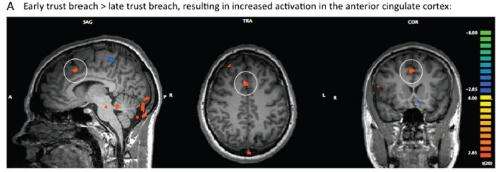September 3, 2013 report
In longterm relationships, the brain makes trust a habit

(Medical Xpress)—After someone betrays you, do you continue to trust the betrayer? Your answer depends on the length of the relationship, according to research by sociologist Karen Cook of Stanford University and her colleagues. The researchers found that those who have been deceived early in a relationship use regions of the brain associated with controlled, careful decision making when deciding if they should continue to trust the person who deceived them. However, those betrayed later in a relationship use areas of the brain associated with automatic, habitual decision making, increasing the likelihood of forgiveness. The study appears in the Proceedings of the National Academy of Sciences.
Cook and her team wanted to understand why some people choose to reconcile after they've become victims of betrayal, but others don't. They hypothesized that if the relationship formed recently, the victim will engage in conscious, deliberate problem solving when deciding how to respond to the deceit. On the other hand, if the relationship has existed for a long time, the victim will take trustworthy behavior for granted and consider a breach of trust an exception to the rule.
To test their hypothesis, the team performed an online experiment, using subjects recruited through an internet survey provider. Each subject received eight dollars and could either keep the money or give it to an unseen partner. If the subject gave the money away, its value would triple. The partner would then decide whether to keep it all or give half back to the subject.
Unbeknownst to the subject, the partner was really a computer, sometimes programmed to betray the subject early in the game and sometimes programmed to betray the subject later. Cook's team found that after an early betrayal, the subject would be more likely to keep the money than after a late betrayal.
When the team repeated the experiment in a laboratory, with subjects hooked up to fMRI scanners, the anterior cingulate cortex, associated with conscious learning, planning and problem solving, and the lateral frontal cortex, associated with feelings of uncertainty, became more active after early betrayal. In contrast, the lateral temporal cortex, associated with habituated decision making, became more active after late betrayal.
As with the first experiment, an early betrayal increased the likelihood of the subject holding onto the money in later rounds. Early betrayal also increased the amount of time taken to make a decision, suggesting that victims of early betrayal were putting more conscious thought into their decisions than victims of late betrayal were.
The researchers hope their study will increase understanding of why some victims of deceit continue to forgive those who deceived them.
More information: Effect of relationship experience on trust recovery following a breach, PNAS, Published online before print September 3, 2013, DOI: 10.1073/pnas.1314857110
Abstract
A violation of trust can have quite different consequences, depending on the nature of the relationship in which the trust breach occurs. In this article, we identify a key relationship characteristic that affects trust recovery: the extent of relationship experience before the trust breach. Across two experiments, this investigation establishes the behavioral effect that greater relationship experience before a trust breach fosters trust recovery. A neuroimaging experiment provides initial evidence that this behavioral effect is possible because of differential activation of two brain systems: while decision making after early trust breaches engages structures of a controlled social cognition system (C-system), specifically the anterior cingulate cortex and lateral frontal cortex, decision making after later trust breaches engages structures of an automatic social cognition system (X-system), specifically the lateral temporal cortex. The present findings make contributions to both social psychological theory and the neurophysiology of trust.
© 2013 Medical Xpress














